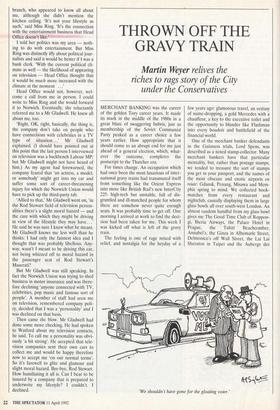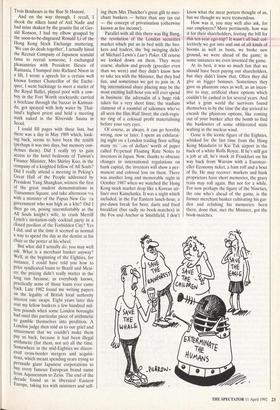THROWN OFF THE GRAVY TRAIN
Martin Weyer relives the
riches to rags story of the City under the Conservatives
MERCHANT BANKING was the career of the golden Tory career years. It made its mark in the middle of the 1980s in a great blaze of swaggering hubris, just as membership of the Soviet Communist Party peaked as a career choice a few years earlier. How appropriate that it should come to an abrupt end for me just ahead of a general election, which, what- ever the outcome, completes the postscript to the Thatcher era.
For times change. An occupation which had once been the most luxurious of inter- national gravy trains had transmuted itself from something like the Orient Express into more like British Rail's new InterCity 225: high-tech but unstable, full of dis- gruntled and ill-matched people for whom there are somehow never quite enough seats. It was probably time to get off. One morning I arrived at work to find the deci- sion had been taken for me. This week I was kicked off what is left of the gravy train.
The feeling is one of rage mixed with relief, and nostalgia for the heyday of a few years ago: glamorous travel, an ecstasy of name-dropping, a gold Mercedes with a chauffeur, a key to the executive toilet and the opportunity to blunder like Flashman into every boudoir and battlefield of the financial world.
One of the merchant banker defendants in the Guinness trials, Lord Spens, was described as a noted stamp-collector. Many merchant bankers have that particular mentality, but, rather than postage stamps, we tended to treasure the sort of stamps you get in your passport, and the names of the most obscure and exotic airports en route: Gdansk, Penang, Misawa and Mem- phis spring to mind. We collected book- matches from every restaurant and nightclub, casually displaying them in large glass bowls all over south-west London. An almost random handful from my glass bowl gives me The Good Time Club of Roppon- gi, Iberia Airways, the Palace Hotel in Prague, the Tahiti Beachcomber, Annabel's, the Ginza in Albemarle Street, Delmonico's off Wall Street, the Lai Lai Sheraton in Taipei and the Auberge des
'We shouldn't have gone for the gloating voter.'
Trois Bonheurs in the Rue St Honore.
And on the way through, I recall, I shook the silken hand of Asil Nadir and had mine shaken by the granite fist of Ger- ald Ronson, I had my elbow grasped by the soon-to-be-disgraced Ronald Li of the Hong Kong Stock Exchange muttering, 'We can do deals together', I actually hired the Recruit Company of Japanese scandal fame to recruit someone, I exchanged pleasantries with President Iliescu of Rumania, I bumped into Richard Nixon in a lift, I wrote a speech for a certain well known former Chancellor of the Exche- quer, I went backstage to meet a starlet of the Royal Ballet, played pool with a cow- boy in the Fort Worth stockyards; carried a briefcase through the bazaar in Katman- du, got sprayed with holy water by Thai- land's highest priest and held a meeting stark naked in the Riverside Sauna in Seoul.
I could fill pages with these lists, but there was a day in May 1989 which, look- ing back, seems to have been the zenith (perhaps it was two days, but memory con- denses them). Did I really try to gain access to the hotel bedroom of Taiwan's Finance Minister, Mrs Shirley Kuo, in the company of a knighted fellow of All Souls? Did I really attend a meeting in Peking's Great Hall of the People addressed by President Yang Shangkun, witness the first of the great student demonstrations in Tiananmen Square, and take afternoon tea With a minister of the Papua New Gu •ea government who was high as a kite? Did I then go on, posing uncomfortably as the All Souls knight's wife, to crash Merrill Lynch's invitation-only cocktail party in a closed pavilion of the Forbidden City? Yes I did, and at the time it seemed as normal a way to spend the day as the dentist at his chair or the potter at his wheel.
But what did I actually do, you may well ask. What is a merchant banker anyway? Well, at the beginning of the Eighties, for instance, I could have told you how to price syndicated loans to Brazil and Mexi- co; the pricing didn't really matter in the long run because, as everybody knows, Practically none of those loans ever came back. Late 1982 found me writing papers on the legality of British local authority interest rate swaps. Eight years later this cost my fellow bankers a few hundred mil- lion pounds when some London boroughs had used this particular piece of arithmetic to gamble themselves into perdition. A London judge then told us to our grief and
amazement that we couldn't make them Pay us back, because it had been illegal arithmetic (for them, not us) all the time. Somewhere in the mid-Eighties we discov- ered cross-border mergers and acquisi- tions, which meant spending years trying to persuade giant Japanese corporations to buy every famous European brand name from Aquascutum to Zeiss. The end of the decade found us in liberated Eastern' Europe, taking tea with ministers and sell- ing them Mrs Thatcher's great gift to mer- chant bankers — better than any tax cut — the concept of privatisation (otherwise known as fee income).
Parallel with all this there was Big Bang, the revolution of the London securities market which put us in bed with the bro- kers and traders, the 'big swinging dicks' of Michael Lewis's Liar's Poker. Of course we looked down on them. They were coarse, shallow and greedy (greedier even than we were) and they didn't know how to take tea with the Minister. But they had fun, and sometimes we got to join in. A big international share placing may be the most exciting half-hour you will ever spend in business: the adrenalin of a huge risk taken for a very short time; the stadium clamour of a roomful of salesmen who've all seen the film Wall Street; the cash-regis- ter ring of a colossal profit materialising before your very eyes.
Of course, as always, it can go horribly wrong, now or later. I spent an exhilarat- ing night on a London trading floor selling many rni -,,ns of dollars' worth of paper called Perpetual Floating Rate Notes to investors in Japan. Now, thanks to obscure changes in international regulations on bank capital, the investors will show a per- manent and colossal loss on them. There was another long and memorable night in October 1987 when we watched the Hong Kong stock market drop like a Korean air- liner over Kamchatka. It was a night which included, in the Far Eastern lunch-hour, a pre-dawn break for beer, darts and fried breakfast (but sadly no book-matches) in the Fox and Anchor in Smithfield. I don't
know what the meat porters thought of us, but we thought we were tremendous.
How was it, you may well also ask, for our employers? More pertinently, how was it for their shareholders, footing the bill for this ten-year ego-trip? It wasn't all bad: col- lectively we got into and out of all kinds of booms as well as busts, we broke new ground, we were ahead of the game; in some instances we even invented the game.
At its best, it was so much fun that we should have been paying our shareholders, but they didn't know that. Often they did give us bigger bonuses. Sometimes they gave us phantom ones as well, as an incen- tive to stay, artificial share options which couldn't be cashed in for several years. And what a grim world the survivors found themselves in by the time the day arrived to encash the phantom options, like coming out of your bunker after the bomb to find the banknotes of some obliterated state wafting in the nuclear wind.
Gone is the iconic figure of the Eighties, whisked for the last time from the Hong Kong Mandarin to Kai Tak airport in the back of a white Rolls Royce. If he's still got a job at all, he's stuck at Frankfurt on his way back from Warsaw with a Eurotrav- eller Economy ticket, a ham roll and a bout of flu. He may recover: markets and bank proprietors have short memories, the gravy train may roll again. But not for a while. For now perhaps the figure of the Nineties, the one who's ahead of the game, is the former merchant banker cultivating his gar- den and relishing his memories: been there, done that, met the Minister, got the book-matches.



















































 Previous page
Previous page